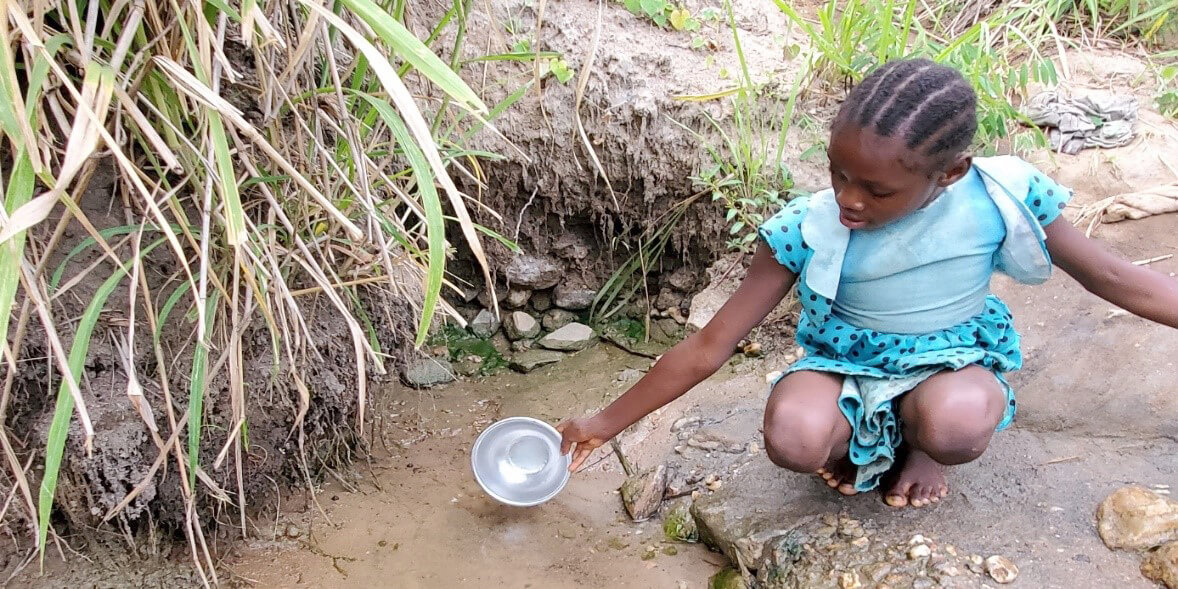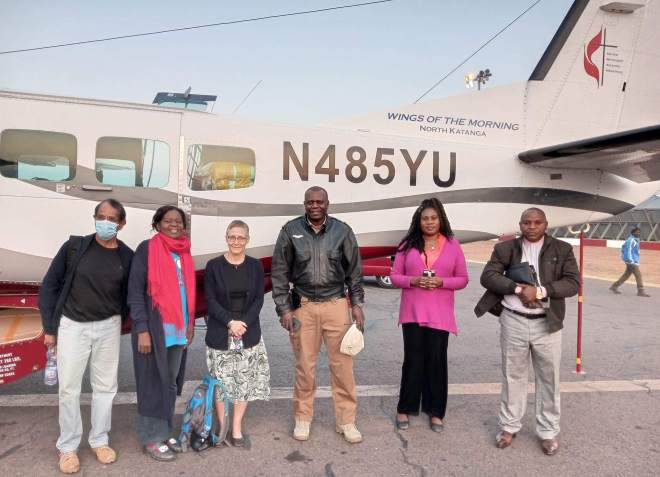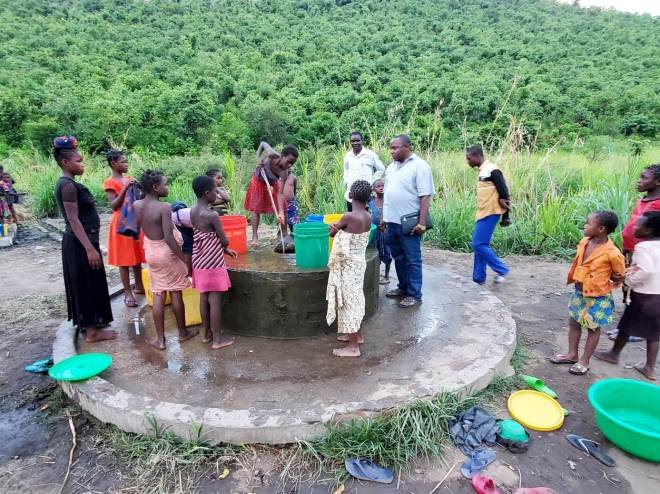
A young girl patiently collects water for her family from a slow-running spring. Collecting water from the source and treating it with chlorine tablets decreases the spread of cholera and other waterborne diseases. PHOTO: COURTESY OF NORTH KATANGA UMC HEALTH BOARD
By Christie R. House
September 19, 2022 | ATLANTA
Suzanne has lived in the Mulongo community in the Democratic Republic of the Congo (DRC) all her life – except for the time of year when epidemics such as cholera broke out. Then the whole family moved out of the village away from the Congo River to wait for the disease to run its course. Her family has good reasons for doing this.
Suzanne summed up their philosophy this way: “It was better to flee than to wait and catch cholera, which can take many members of your family in a very short time.”
When she was growing up, Suzanne lived in a household of three extended families with a total of 31 people – four adults and 27 children. Her remote village had no medicine for cholera. One year, Suzanne’s mother and another mother in the household died. She also lost four brothers and 15 more of the children in her extended family, bringing the number in the family from 31 to 11.
All of these family members were lost in the space of two months, even though the family moved several times that year to try to mitigate the spread. Finally, her father took the remaining family members miles away from the river. He did this every time an outbreak occurred, even though it disrupted the children’s schooling.
Today, at 38 years of age, Suzanne is one of the few in her family to survive. She is married with 12 children of her own, but her family no longer flees to avoid exposure to cholera and other waterborne diseases. Several health partners have come together to bring hope to Suzanne and other residents of the region.
Knowledge, prevention and treatment
Global Ministries’ Global Health program has been working on cholera with the United Methodist North Katanga Health Board for several years, supporting several communities like Mulongo. A phased grant process is assisting the North Katanga UMC as it joins forces with other health partners to arrest the spread and prevent future outbreaks in this specific region.

Working with the Democratic Republic of Congo Provincial Health Department, local health programs and Doctors Without Borders, the UMC has joined an overall effort through Global Health to: clean up and test community water sources; build sanitation facilities; stock and distribute infection prevention control materials and medicines to treat cholera in its clinics; and enhance local community education efforts on how cholera is contracted and spread through contaminated water sources.
As a result of these various efforts, Suzanne has learned how to protect her family and where to receive treatment, medicine, and prevention and hygiene supplies during cholera outbreaks.
“With awareness and training, I am no longer afraid of cholera because before we did not respect hygiene measures and there was no help,” Suzanne said. “Since the digging of wells, construction of public toilets and instruction of households to build their own toilets, we may go a year or more without cholera being declared in our community.”
As soon as the epidemic broke out in 2021, the United Methodist health facilities with support from Global Health were early responders, which limited the number of deaths in the community. A population that would otherwise have tried to leave their communities to escape the disease visited the health centers instead, where cholera treatment was offered without charge. Clinics distributed aqua tabs with chlorine to filter water in homes.
Success has come for Mulongo and a couple nearby villages with a lot of hard work thanks to this integrated community health effort. But more work needs to be done, because cholera has now affected new communities down river who have not yet received the training. It will likely appear again in Mulongo too, as a recurring problem.
A main accomplishment has been to change the behavior of community members. Many now avoid collecting river water for household use and to draw from wells that are tested and treated for safety or spring water collected at the source, which is still filtered before use in the household.
Reaching more people with life-giving services
The North Katanga Episcopal Area coordinates additional clinics and health centers along the Congo River. Dr. Alexis Ngoy Kasole Maloba, the North Katanga health board coordinator, plans to continue to move into new villages to stock the clinics with medicines and rehydration kits, train more community members to intensify prevention efforts and provide hygiene kits and chlorination tablets for households that need them.

The current cholera project has completed its second phase. Through monitoring and evaluation, the health board estimates that nearly 400,000 have been reached so far. Inhabitants of the neighboring villages are reached by expanding cholera-prevention educational activities, including broadcasting community-focused discussions via radio.
Th health board includes pastors in its training, so they can recognize the symptoms of cholera. Pastors often visit parishioners who are sick or have had a death in the family. Pastor Jean Pierre Kalunga is more attentive now during house visitations. If he suspects cholera, he may request that the family pray with him outside the house without making direct contact with the sick person.
Then he encourages family members to take the affected individuals to the UMC clinic for diagnosis and treatment. After the prayer, the pastor explains to the family, “I am trained to help people by informing, raising awareness, and transferring the sick from the community to the health center.” Often, he accompanies the family, offering pastoral care.
Reaching families through the UMC health facilities allows the medical staff to provide case management as well as treatment while the prevention activities are ongoing in the community, which helps to identify other risks that might increase transmission of cholera and similar waterborne diseases.
Pastor Jean explains, “You can’t run away from the disease, you have to know what it is and fight it.”
No family should lose 20 members to cholera, a preventable and treatable disease. Help increase the efforts of Global Health interventions by supporting Abundant Health Advance, #3021770.
Christie R. House is a consultant writer and editor with Global Ministries and UMCOR.

